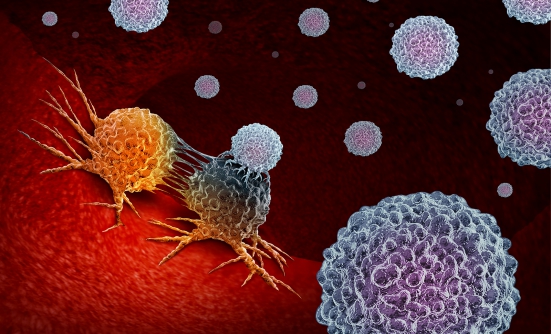Our natural immune system is made of cells and other substances that help our body to defend itself by fighting foreign invaders, such as contaminated substances in the air and viral or bacterial infections, as well as to destroy abnormal cells, including cancerous cells. But our immune system is imperfect and can sometimes be weakened for different reasons; the result is that the immune system can miss abnormal bodies and abnormal cells, including cancer cells.
Furthermore, according to the American Cancer Society, because cancer cells start as normal cells, our immune system cannot always identify them as foreign cells. This further shows the limits of our immune system in fighting cancer alone. This is where immunotherapy comes in. The goal of immunotherapy is to help our immune system to fight cancer.
How Immunotherapy Works
Recent advances in cancer therapies have focused on harnessing the function of our own immune system in the fight against cancer, using a variety of new technologies and methods to develop different types of immunotherapies.
Several types of immunotherapies are available today that have shown success in treating cancer and/or stopping the progression of different types of solid tumors and some types of blood cancer that no other treatments were able to do before.
As new immunotherapies are being developed, more cancer types now have specific immunotherapies that can fight that cancer or even multiple cancer types, and some are focused on specific alterations in cancer cells or gene mutations, regardless of type.
The one thing the different immunotherapies have in common is their ability to identify and destroy cancer cells in a solid tumor or in the blood, using different methods.

“Cancer cells multiply and spread because they can hide from our immune system,” according to Bruce Gershenhorn, DO, Medical Director, Lung Cancer Center, Cancer Treatment Centers of America, Chicago, Illinois. “Immunotherapy drugs work by robbing cancer cells of their ability to hide, or by revving our immune system so that it can identify and attack those cells,” he said in an article published in CONQUER magazine.
Part of the normal function of our immune system is to detect and destroy cancerous or other abnormal cells, which prevent the development of many cancers. One such example is immune cells within the tumor or around it, which are called tumor-infiltrating lymphocytes (or TILs). These TILs indicate that the immune system is attempting to attack the tumor.
But as Dr. Gershenhorn says, although the immune system can prevent or slow the growth of cancer, cancer cells are often able to hide from our immune system and avoid being destroyed by it.
According to the National Cancer Institute, cancer cells can avoid being discovered by our immune system for several reasons, because they may have:
- Genetic changes (or mutations) that make them less visible to our immune system
- Certain proteins on the cell surface that can protect them from our immune cells
- The ability to influence normal cells around the tumor and cause the tumor to interfere with the way the immune system attacks or responds to cancer cells.
Therefore, the goal of immunotherapy is to block the ability of cancer cells to hide from our immune system and to strengthen the immune system so it prevents cancer cells from avoiding it and being destroyed by it.
Types of Immunotherapy
Older types of immunotherapies have been used for many years, but in the past decade or so, several new types of immunotherapies have made significant progress in their ability to fight cancer and stop its progress. The newer immunotherapies today have focused on the following
3 types:
- Checkpoint inhibitors, also known as PD-1 or PD-L1 inhibitors, are drugs that block the proteins or other checkpoints on cancer cells that help cancer cells hide from the immune system; by blocking those checkpoints, the immunotherapy drug helps the immune system to recognize and attack the cancer cells in the tumor.
- Chimeric antigen receptor (CAR) T-cell therapy. CAR T-cell therapy uses a process that removes T-cells from the patient’s blood and modifies these T-cells to recognize and attach themselves to cancer cells; these modified T-cells are then placed back into the patient’s body so they can recognize and destroy cancer cells.
- Monoclonal antibodies are a man-made version of proteins in our immune system, which are designed to attack a specific part of the cancer cells.
- Other types of immunotherapies include cytokines, which are small proteins used to stimulate the immune cells and attack cancer cells; immunomodulators, which are drugs that boost the immune system and treat cancer; and cancer vaccines that are used to start an immune response to fight cancer.
Side Effects
Like all cancer therapies, immunotherapy is associated with side effects that are caused by the immune system itself. This occurs when the immune system goes into overdrive and attacks healthy organs and tissues, such as the skin, the nervous system, and other body systems, in addition to cancer cells.
However, most often, the side effects of immunotherapy are often less severe than side effects caused by other treatments, such as chemotherapy, and occur less frequently. Most immunotherapy side effects will occur within the first few weeks of treatment. But keep in mind that some side effects can start some time, even months, after starting or completing treatment with immunotherapy.
Therefore, you should notify your doctor immediately if you are aware of any immunotherapy-related side effects to ensure these side effects are being treated immediately. In some cases of severe side effects, the immunotherapy will have to be stopped. Although most immunotherapy side effects are not severe, some can be serious or even life-threatening.
“Left unchecked, immune-mediated adverse reactions can cause serious problems and may affect the course of your cancer treatment,” Dr. Gershenhorn said.
For more information about the side effects associated with immunotherapy, and specifically with CAR T-cell therapy, check out the recently released guidelines for patients from the National Comprehensive Cancer Network, available at www.nccn.org/patients/guidelines/content/PDF/immunotherapy-se-car-tcell-patient.pdf#. The guidelines are prepared specifically for patients with cancer, by this national organization of cancer experts.
Talk with Your Oncologist
Ask your doctor to see if immunotherapy is a good option for you. Your doctor will determine what type of immunotherapy you will receive and how long you should receive treatment based on your type of cancer and the specific stage of the cancer, in addition to other factors unique to your specific situation.
Before you start treatment with immunotherapy, you should talk with your doctor to make sure you understand what it is and why it is recommended to you, as well as what may be the side effects that you should look for.
Because immunotherapy can have side effects that don’t cause any obvious symptoms, your doctor will monitor your progress and order blood tests to check for specific markers that may signal an adverse reaction to the immunotherapy.
New Options in Clinical Trials
Many immunotherapy medications are available today for different types of cancer, including bladder cancer, melanoma, skin cancer, non-Hodgkin lymphoma, kidney cancer, head and neck cancer, lung cancer, and others.
Moreover, new immunotherapies are being developed for different cancers and are currently in clinical trials. Clinical trials test new immunotherapies to ensure that they are safe and effective; in addition, they are also being studied in combination with other therapies, including other immunotherapies, to see if their benefit can be even greater when used together with other therapies.
The best way for patients to try a new immunotherapy may be by joining a clinical trial. Check with your doctor to see if immunotherapy may be a good option for you, and if joining a clinical trial with an immunotherapy may be a good idea.
Patient Resources
American Cancer Society
www.cancer.org/treatment/treatments-and-side-effects/treatment-types/immunotherapy/what-is-immunotherapy.html
CONQUER magazine
conquer-magazine.com/issues/2020/vol-6-no-1-february-2020/1192-what-can-you-expect-with-cancer-immunotherapy
National Cancer Institute
www.cancer.gov/about-cancer/treatment/types/immunotherapy#how-does-immunotherapy-work-against-cancer
National Comprehensive Cancer Network
www.nccn.org/patients/guidelines/content/PDF/immunotherapy-se-car-tcell-patient.pdf#















